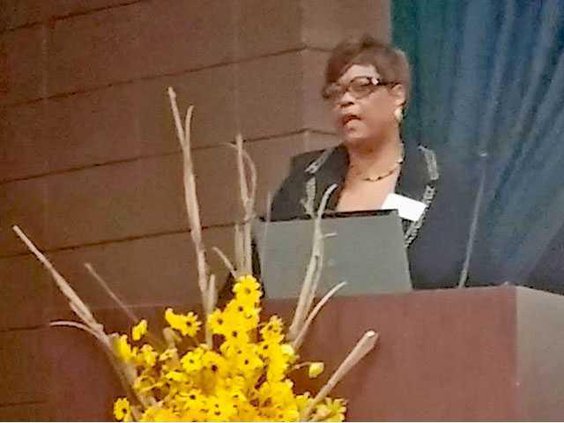The Liberty County School System held a community forum last Thursday at the Performing Arts Center, which included discussion on becoming a charter-school system.
Superintendent Dr. Valya Lee said that in 2010, legislation looked at how schools were spending funds. The review considered the state of the economy and how to advance the school system in Georgia so students can be competitive in the global market. The Legislature decided to give Georgia schools the option of continuing with their current school systems or becoming charter schools.
“A charter is more or less a contract between the Liberty County School System and the Georgia Department of Education. The district gains some flexibility in how to implement innovative change in the school system. The purpose for that is to give us the opportunity to do it our way,” Lee said. “For many years, the state department of education told the school system and classroom teachers how to do it, and they will continue to guide us. However, more importantly, they free us up. We will be moving towards more of a school-based leadership and decision-making.”
In January, the school board began to take a closer look at the charter-school option. Between January and March, Lee, staff members, principals and community members discussed different flexibility options under the charter system. By April, the board approved moving forward with the charter-system application.
Strategic planning sessions were held over two days between May and June, in which community leaders, faith-based community members, parents and students discussed the process of application. In July, Lee drafted a letter of intent to pursue the application on behalf of the board to the GADOE.
Nov. 1 is the deadline for charter-application submissions. By May 2015, the board will be notified if the application has been approved.
Lee talked about the benefits of moving to the charter system. Each school will be governed by a governance team, which includes the principal, one teacher or staff member, two parents and one business leader. Members will be selected by stakeholder bodies. The principal will have more say on the governance team when handling personnel issues, financial decisions, resource allocations, curriculum and achievement monitoring. A school will have the ability to receive $87 per student after becoming a charter — almost an additional $10,000 every year.
The charter system also will allow flexible scheduling for content instruction.
“Sometimes, the teacher who’s on a 55-minute schedule or block schedule just needs a little bit more time. We’ll have that autonomy and charge of developing those schedules that will best meet the needs of the students,” Lee explains. “Each school has its own student body, and that student body varies from school to school. So, we will no longer do cookie-cutter allocation funding. We’re going to fund based on the needs, performance data and what that governance team is interested in having.”
The school board also plans to implement programs such as the Inter-Agency Council and Capstone Project. The Inter-Agency Council is a group of local agencies like the Department of Family and Child Services, criminal-justice programs and other services that periodically brainstorm intervention ideas for youth. Lee hopes to expand the program to include more organizations and to meet more often. Capstone Project will talk with eighth-grade students about their interests. As students transition to ninth grade, they will be connected with staff to begin a corporate study focusing on their career interests — this will continue through 12th grade. This program then will be coupled with a dual-enrollment campaign that soon will be launched called College Credit Now. Students will be able to enter college with credit and be familiar with doing research projects.
Blended-learning opportunities also will be implemented with credit recovery. Currently, credit recovery allows students to retake courses to earn credit toward graduation with computer-assisted instructors. Blended learning will give students face-to-face instruction with teachers who can help as well.
Other programs that will continue include Retired Educators Supporting Student Learning and Achievement, retired educators who help students catch up in their school work, Science Technology Engineering and Mathematics (STEM) and access to fine arts for visual instruction.
After the presentation, parents attended breakout sessions where they had the opportunity to ask questions about the charter system and other school-related functions. Session topics included communication, state reporting, transportation, curriculum and nutrition.
In one session focused on finances, a parent asked about the effect on the school-lunch program.
“The school-lunch program is a federally funded program, so that will be in addition to whatever the state provides for the charter,” LCSS Chief Financial Officer Roger Reese said. “There will be no difference in how the school-lunch program is done. We will continue to receive those federal funds through the state.”
Parents who wanted more information were encouraged to submit their questions, which will be answered in the future on the Liberty County School System website.
Charter program discussed at forum


Sign up for our e-newsletters